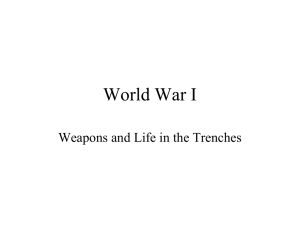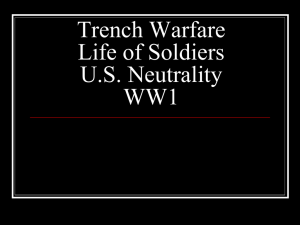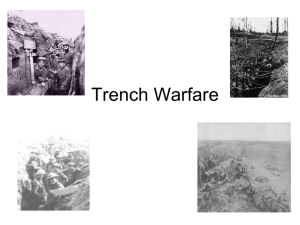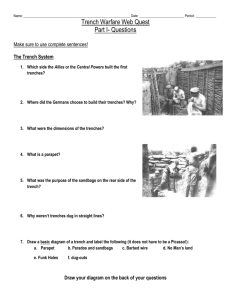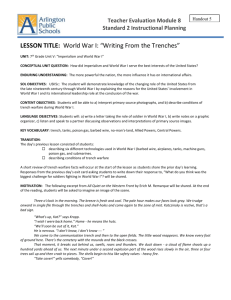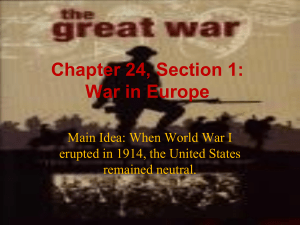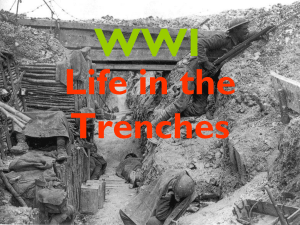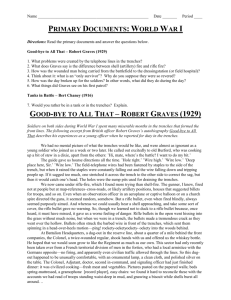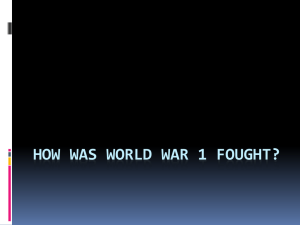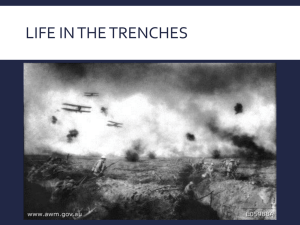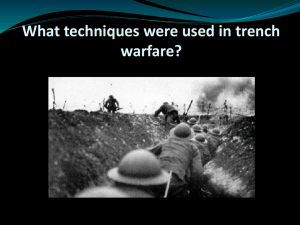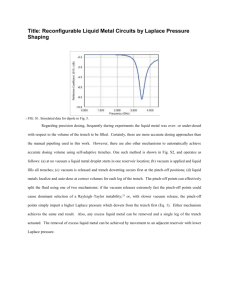World-War-I-weapons-trenches-and
advertisement
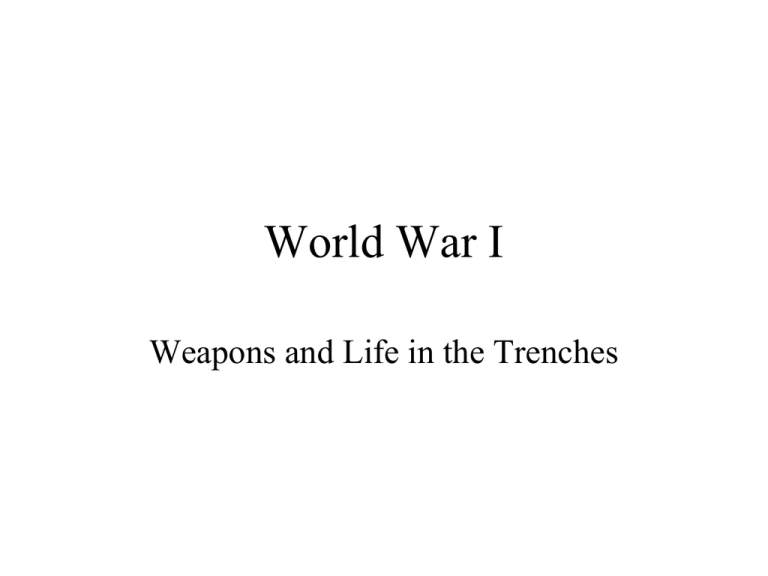
World War I Weapons and Life in the Trenches Objective: To examine the horrors of trench warfare. Trench Warfare Trench Warfare – type of fighting during World War I in which both sides dug trenches protected by mines and barbed wire Cross-section of a front-line trench British trench, France, July 1916 (during the Battle of the Somme) British trench, France, July 1916 (during the Battle of the Somme) French soldiers firing over their own dead An aerial photograph of the opposing trenches and no-man's land in Artois, France, July 22, 1917. German trenches are at the right and bottom, British trenches are at the top left. The vertical line to the left of centre indicates the course of a pre-war road. Trench Rats Many men killed in the trenches were buried almost where they fell. These corpses, as well as the food scraps that littered the trenches, attracted rats. Quotes from soldiers fighting in the trenches: "The rats were huge. They were so big they would eat a wounded man if he couldn't defend himself." "I saw some rats running from under the dead men's greatcoats, enormous rats, fat with human flesh. My heart pounded as we edged towards one of the bodies. His helmet had rolled off. The man displayed a grimacing face, stripped of flesh; the skull bare, the eyes devoured and from the yawning mouth leapt a rat." Officers walking through a flooded communication trench. WARNING: NASTY TRENCH FOOT SLIDES NEXT!!! TRENCH FOOT!!!! Dulce Et Decorum Est, by Wilfred Owen Bent double, like old beggars under sacks, Knock-kneed, coughing like hags, we cursed through sludge, Till on the haunting flares we turned our backs And towards our distant rest began to trudge. Men marched asleep. Many had lost their boots But limped on, blood-shod. All went lame; all blind; Drunk with fatigue; deaf even to the hoots Of disappointed shells that dropped behind. GAS! Gas! Quick, boys!-- An ecstasy of fumbling, Fitting the clumsy helmets just in time; But someone still was yelling out and stumbling And floundering like a man in fire or lime.-Dim, through the misty panes and thick green light As under a green sea, I saw him drowning. In all my dreams, before my helpless sight, He plunges at me, guttering, choking, drowning. If in some smothering dreams you too could pace Behind the wagon that we flung him in, And watch the white eyes writhing in his face, His hanging face, like a devil's sick of sin; If you could hear, at every jolt, the blood Come gargling from the froth-corrupted lungs, Obscene as cancer, bitter as the cud Of vile, incurable sores on innocent tongues,-My friend, you would not tell with such high zest To children ardent for some desperate glory, The old Lie: Dulce et decorum est Pro patria mori. (“How fitting and sweet it is to die for one’s country.”) Soldiers digging trenches while protected against gas attacks 'Gassed'. Painting by John Singer Sargent, 1918/1919. Early Gas Masks • The canister gas mask was developed to protect the soldier from the use of chlorine gas and tearing agents such as xylyl bromide. This type of mask was not effective in filtering out the more deadly phosgene and diphosgene gases. There was no mask that could offer protection from the blistering mustard gas which attacks all exposed flesh. Poison Gas Deaths: 1914-1918 Country Non-Fatal Deaths Total British Empire 180,597 8,109 188,706 France 182,000 8,000 190,000 United States 71,345 1,462 72,807 Italy 55,373 4,627 60,000 Russia 419,340 56,000 475,340 Germany 191,000 9,000 200,000 Austria-Hungary 97,000 3,000 100,000 Others 9,000 1,000 10.000 1,205,655 91,198 1,296,853 Total Resting in the Trenches Australians resting up in a dug-out are sheltered from shelling 15 feet underground during the Battle of the Somme, July 1916 Diagram of Trenches • Diagram of a dug-out as being used by the Australians in the photo Preparing to Move • The Lancashire Fusiliers fix bayonets as they prepare to go "over the top" in the Battle of the Somme, July 1916 German Trenches • This captured section of German trench at the Somme helps explain why the initial British artillery barrage did little to weaken the Germans. Much deeper than the British trenches, the German trench system offered amenities such as barber shops and officer clubs! POW’s • Posed German photo illustrating POW types: (from left) Annamite, Tunisian, Senegalese, Sudanese, Russian, American, Portuguese, and English (1918). Role of African-Americans • The "Harlem Hellfighters", American 369th Regiment who fought beside the French 16th Division. The longest fighting American unit in World War I, they received a total of 171 Croix de Guerre decorations (1918). New Uniforms: Stormtroopers • The sturmtruppen uniform - sleek, allowing for unhindered movement. A far cry from the infantry uniforms and cumbersome packs of earlier years. • Stormtroopers exhibiting their weapons cache. Note the formidable array of grenades and bombs - all state-of-the-art for 1917. Moving out at dawn… • Sturmtruppen silhouetted against the morning sky. These troops would be brought up to the front under the cover of night so that they would not be detected by enemy reconnaissance. The surprise must be complete. Moving forward! • Positioning newly brought-up artillery for the surprise attack. A brief, but intense, barrage of high-explosives and gas will prepare the way for the shock troops. The enemy will still be dazed by the time the first wave reaches them! The Christmas Truce, 1914 • Germans began decorating outside trenches • Sung carols • Exchanged gifts across “no man’s land!” • British, French, and German soldiers on the Western Front “Belleau Wood,” by Garth Brooks Oh the snow flakes fell in silence Over Belleau Wood that night For a Christmas truce had been declared By both sides of the fight As we laid there in our trenches The silence broke in two By a German soldier singing A song that we all knew Though I did not know the language The song was Silent Night Then I heard my buddy whisper "All is calm, all is bright" Then the fear and doubt surrounded me Cause I'd die if I was wrong But I stood up in my trench And I began to sing along Then across the frozen battlefield Another's voice joined in Until one by one each man became A singer of the hymn Then I thought I was dreaming For right there in my sight Stood the German soldier Neath the falling flakes of white And he raised his hand and smiled at me As if seemed to say Here's hoping we both live to see Us find a better way Then the devils clock struck midnight And the skies lit up again And the battlefield where heaven stood Was blown to hell again But for just one fleeting moment The answer seemed so clear Heaven's not beyond the clouds Its just beyond the fear No heaven's not beyond the clouds It's for us to find here Stalemate on the Western Front • Trench warfare: extremely hard to MOVE forward • Example: at Verdun in 1916 750,000 men lost their lives and the Western front had moved LESS THAN 10 MILES! British Vickers machine gun crew, western front, World War I. Eastern Front: More MOBILE • Russian DISASTER at Tannenberg: 92,000 taken prisoner and 30,000 killed: Germans “only” lose 13,000
